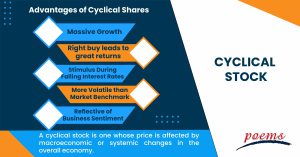Cyclical Stock
Table of Contents
What Is a Cyclical Stock?
A cyclical stock is one whose price is affected by macroeconomic or systemic changes in the overall economy. These stocks also follow the cycles which an economy goes through like expansion, peak, recession, and recovery.
Most cyclical stocks are of companies that sell products that sell more during a booming economy and less during a recession period.
Cyclical stocks are more volatile than non-cyclical or defensive stocks, which remain stable during periods of economic growth. But investing in cyclical stocks offers greater potential for growth as they outperform other stocks during periods of economic strength in the economy.
Portfolios with a mix of cyclical stocks and defensive stocks balance out the former’s volatility with long term growth of the latter.
Cyclical stocks are generally the opposite of defensive stocks and include companies like Starbucks or Nike.
Understanding Cyclical Stocks
Car manufacturers, airlines, furniture retailers, clothing stores and hotels and restaurants are businesses that can be considered as cyclical. This is because people can afford to buy new cars, upgrade their homes, shop and travel during an economic boom.
Consumers cut out discretionary expenses the moment the economy suffers from recession. So in the worst case scenario, cyclical stocks may even become worthless, and companies may become bankrupt.
Investors should try to include cyclical stocks in their portfolio to make the most of the gains during a boom, but should also be careful about their positions and monitor them closely.
Cyclical stocks are somewhat predictable as they rise and fall with economic cycle. So, investors tend to buy these shares at a low point and sell them at a high point.
Advantages of Cyclical Shares
- Massive Growth – The value and prices of cyclical stocks skyrocket during a boom in the economy as they reflect confidence of consumers in such companies when the economy is growing.
- Right buy leads to great returns – Investment just before the boom period in an economy can lead investors to amass enormous gains when the stocks start doing well.
- Stimulus During Falling Interest Rates – Cyclical stocks have better valuations when interest rates are falling in the economy. Low Interest costs and increased earnings are further reflected in the stock price.
- More Volatile than Market Benchmark – Investments in sectors which are dependent on the economic strength of the country, such as the technology or the real estate sector, will be able to generate returns above the market benchmark.
- Reflective of Business Sentiment – Cyclical stocks mirror the business cycle and investors can analyse the direction of the economy by understanding the movement of cyclical stocks.

Limitations of Cyclical Securities
- Major Fall during Times of Recession – Cyclical stocks witness a significant fall in value during times of recession and investors who are not able to manage their investments before the onset of economic decline have to face harsh consequences.
- Timing Matters – Timing for buying and selling cyclical stocks is of immense importance as mistakes in doing so may lead to investors suffering huge losses. In-depth research and analysis should be done before investing in such stocks.
- High Volatility – The high volatility of the stocks may be frustrating for investors who prefer stability in their portfolio. The stocks have a tendency to go far below the benchmark leading to poor returns for investors.
- Requires in depth Research and Analysis – The volatile nature of cyclical stocks can be understood by deep research and analysis. So, one should spend sufficient time and follow the trends in the market to predict upcoming signs and make the right decisions pertaining to the buying and selling of the stocks.
- Not suitable for Passive Investors – Investment in cyclical stocks requires constant monitoring of the market trends and being active with the buying and selling to maximize earnings. But long term and passive investors lack that commitment and effort. If cyclical stocks are held in a recession, they cause significant erosion to the value of the holdings.
Cyclical Vs Non-Cyclical Stocks
The performance of cyclical stocks correlates with the economy, which isn’t the case with non-cyclical stocks. Non-cyclical stocks are also called defensive stocks and tend to do well even when there’s a slowdown in the economy.
Companies providing food, gas, and water like Walmart are non-cyclical stocks. Investing in non-cyclical stocks is a sound strategy to offset losses sustained from cyclical stocks during an economic recession.
When to Invest in Cyclical Shares?
Cyclical stocks fare poorly when interest rates are rising and do best when interest rates are falling as such rates stimulate the economy. But investors should also refrain from buying in the first year of falling interest rates.
Cyclical stocks should be bought right before a slump and should be sold when there is upward movement in the economy. Choosing good quality cyclical shares with robust financials helps in making huge gains.
Market savvy investors should keep track of market trends and cyclical shifts which take place in many sectors. One can buy cyclical stocks during the recovery period and exit when the cycle is reversed.
Frequently Asked Questions
Durables, nondurables, and services sectors showcase cyclical stocks. Durable goods companies manufacture or distribute physical goods that have a life span of more than three years. The strength of durable goods orders indicates stronger activity in the economy. Ford, Whirlpool, IKEA are some companies that operate in this segment.
Nondurable goods companies produce or distribute soft goods with a life span of less than three years. Nike, Target are companies in this segment.
Services do not manufacture or distribute physical goods but provide services that facilitate leisure activities for consumers. Walt Disney, Netflix operate in this segment.
Basic materials, consumer cyclical, financial services, and real estate are some of the market sectors which are cyclical in nature.
Tesla would be considered a cyclical stock because people would forgo buying cars during a recession.
Amazon would be considered a non-cyclical stock as it provides groceries and other essential services which people would have to avail even during a recession.
Related Terms
- Payment Date
- Treasury Stock Method
- Reverse stock splits
- Ticker
- Restricted strict unit
- Gordon growth model
- Stock quotes
- Shadow Stock
- Margin stock
- Dedicated Capital
- Whisper stock
- Voting Stock
- Deal Stock
- Microcap stock
- Capital Surplus
- Payment Date
- Treasury Stock Method
- Reverse stock splits
- Ticker
- Restricted strict unit
- Gordon growth model
- Stock quotes
- Shadow Stock
- Margin stock
- Dedicated Capital
- Whisper stock
- Voting Stock
- Deal Stock
- Microcap stock
- Capital Surplus
- Multi-bagger Stocks
- Shopped stock
- Secondary stocks
- Screen stocks
- Quarter stock
- Orphan stock
- One-decision stock
- Repurchase of stock
- Stock market crash
- Half stock
- Stock options
- Stock split
- Foreign exchange markets
- Stock Market
- FAANG stocks
- Unborrowable stock
- Joint-stock company
- Over-the-counter stocks
- Watered stock
- Zero-dividend preferred stock
- Bid price
- Authorised shares
- Auction markets
- Market capitalisation
- Arbitrage
- Market capitalisation rate
- Garbatrage
- Autoregressive
- Stockholder
- Penny stock
- Noncyclical Stocks
- Hybrid Stocks
- Large Cap Stocks
- Mid Cap Stocks
- Common Stock
- Preferred Stock
- Small Cap Stocks
- Earnings Per Share (EPS)
- Diluted Earnings Per Share
- Dividend Yield
- Blue Chip Stocks
- Averaging Down
Most Popular Terms
Other Terms
- Physical ETF
- Initial Public Offering
- Buyback
- Secondary Sharing
- Bookrunner
- Notional amount
- Negative convexity
- Jumbo pools
- Inverse floater
- Forward Swap
- Underwriting risk
- Reinvestment risk
- Final Maturity Date
- Secondary Market
- Margin Requirement
- Mark-to-market
- Pledged Asset
- Yield Pickup
- Subordinated Debt
- Trailing Stops
- Stochastic Oscillator
- Bullet Bonds
- Basket Trade
- Contrarian Strategy
- Exchange Control
- Notional Value
- Relevant Cost
- Dow Theory
- Speculation
- Stub
- Trading Volume
- Going Long
- Pink sheet stocks
- Rand cost averaging
- Sustainable investment
- Stop-limit sell order
- Economic Bubble
- Ask Price
- Constant prepayment rate
- Covenants
- Stock symbol
- Companion tranche
- Synthetic replication
- Bourse
- Beneficiary
- Witching Hour
- Widow and Orphan stock
- Public Float
- Closing Price
- Quiet period
Know More about
Tools/Educational Resources
Markets Offered by POEMS
Read the Latest Market Journal

Back in Business: The Return of IPOs & Top Traded Counters in March 2024
Start trading on POEMS! Open a free account here! At a glance: Major indices continue...

Weekly Updates 15/4/24 – 19/4/24
This weekly update is designed to help you stay informed and relate economic and company...

From $50 to $100: Unveiling the Impact of Inflation
In recent years, inflation has become a hot topic, evoking strong emotions as the cost...

Japan’s Economic Resurgence: Unveiling the Tailwinds Behind Nikkei 225’s Record Leap
Source: eSignal, Intercontinental Exchange, Inc. In the heart of Japan’s economic landscape, the Nikkei 225...

Weekly Updates 8/4/24 – 12/4/24
This weekly update is designed to help you stay informed and relate economic and...

What Makes Forex Trading Attractive?
In a world where the click of a button can send goods across oceans and...

Weekly Updates 1/4/24 – 5/4/24
This weekly update is designed to help you stay informed and relate economic and company...

How to soar higher with Positive Carry!
As US Fed interest rates are predicted to rise 6 times this year, it’s best...












